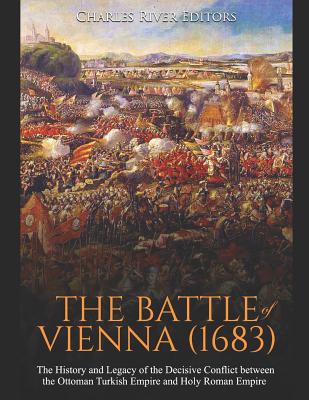The Battle of Vienna (1683): The History and Legacy of the Decisive Conflict between the Ottoman Turkish Empire and Holy Roman Empire

The Battle of Vienna (1683): The History and Legacy of the Decisive Conflict between the Ottoman Turkish Empire and Holy Roman Empire
*Includes online resources and a bibliography for further reading
"Ours are treasures unheard of . . . tents, sheep, cattle and no small number of camels . . . it is victory as nobody ever knew before, the enemy now completely ruined, everything lost for them. They must run for their sheer lives . . . General Starhemberg hugged and kissed me and called me his saviour." - Polish King John III Sobieski
There are certain events that are famous not so much in themselves, noteworthy as they might be, but on account of their role in the context of history. Seismic shifts pivot upon the outcome of such events, and many of them come from battles, for it is an unfortunate but irrefutable fact of history that humanity is shaped by the force of arms. Salamis, Hastings, Agincourt, Waterloo, Sedan, and Stalingrad all fit into this category, and the 1683 Battle of Vienna or Kahlenberg (named after a hill near the city) can also, with eminent justification, be placed in the list of era-changing conflicts. For nearly 1,000 years, there had been a clash for the souls, hearts, and bodies of societies across Europe, Africa, and Asia.
The conflict between Christianity and Islam has been one of the defining factors in Europe and the Middle East, and while this dichotomy might be an excessively simple and incomplete explanation, there is no doubt that it has generated the world today. From Arabia, Islam surged forth onto the world stage in the 7th century as a religion carried by the force of arms. By the middle of the 8th century, the Islamic Caliphate had conquered the Levant, parts of North Africa, and even parts of Spain, all regions which had converted to Christianity in the previous three centuries. An Islamic invasion of France was turned away at the Battle of Poitiers in 732, and a Western counter-offensive known as the Reconquista lasted about 700 more years. Away from Europe, Christian and Muslim forces fought the Crusades around the Holy Land.
Toward the end of the 17th century, the preeminent Islamic power in the world was the Ottoman Empire. From lowly beginnings as a vassal of the Anatolian Sultanate of Rum Osman I, from whom the empire was named, it expanded into the lands of the Christian Byzantine Empire, and by 1683, the year of the Battle of Vienna, the Ottomans ruled Asia Minor, the Middle East (with the exception of Iran), northern Africa to the borders of Morocco, the Balkan Peninsula up to the lands of modern Poland, as
PRP: 86.34 Lei
Acesta este Prețul Recomandat de Producător. Prețul de vânzare al produsului este afișat mai jos.
77.71Lei
77.71Lei
86.34 LeiLivrare in 2-4 saptamani
Descrierea produsului
*Includes online resources and a bibliography for further reading
"Ours are treasures unheard of . . . tents, sheep, cattle and no small number of camels . . . it is victory as nobody ever knew before, the enemy now completely ruined, everything lost for them. They must run for their sheer lives . . . General Starhemberg hugged and kissed me and called me his saviour." - Polish King John III Sobieski
There are certain events that are famous not so much in themselves, noteworthy as they might be, but on account of their role in the context of history. Seismic shifts pivot upon the outcome of such events, and many of them come from battles, for it is an unfortunate but irrefutable fact of history that humanity is shaped by the force of arms. Salamis, Hastings, Agincourt, Waterloo, Sedan, and Stalingrad all fit into this category, and the 1683 Battle of Vienna or Kahlenberg (named after a hill near the city) can also, with eminent justification, be placed in the list of era-changing conflicts. For nearly 1,000 years, there had been a clash for the souls, hearts, and bodies of societies across Europe, Africa, and Asia.
The conflict between Christianity and Islam has been one of the defining factors in Europe and the Middle East, and while this dichotomy might be an excessively simple and incomplete explanation, there is no doubt that it has generated the world today. From Arabia, Islam surged forth onto the world stage in the 7th century as a religion carried by the force of arms. By the middle of the 8th century, the Islamic Caliphate had conquered the Levant, parts of North Africa, and even parts of Spain, all regions which had converted to Christianity in the previous three centuries. An Islamic invasion of France was turned away at the Battle of Poitiers in 732, and a Western counter-offensive known as the Reconquista lasted about 700 more years. Away from Europe, Christian and Muslim forces fought the Crusades around the Holy Land.
Toward the end of the 17th century, the preeminent Islamic power in the world was the Ottoman Empire. From lowly beginnings as a vassal of the Anatolian Sultanate of Rum Osman I, from whom the empire was named, it expanded into the lands of the Christian Byzantine Empire, and by 1683, the year of the Battle of Vienna, the Ottomans ruled Asia Minor, the Middle East (with the exception of Iran), northern Africa to the borders of Morocco, the Balkan Peninsula up to the lands of modern Poland, as
Detaliile produsului













